“Close only counts in horseshoes and hand grenades.”
– Hall of Fame outfielder/first baseman Frank Robinson
* * *
Baseball is a game steeped in history, and diehard fans are not always great at accepting changes. Case in point, the new pitch clock still has many detractors among the faithful. However, after the past weekend’s games in Los Angeles and the controversial calls, the outcry may a little louder for some sort of change.
It started out as a minor irritation Friday evening when former Dodger, now Chicago Cubs outfielder Cody Bellinger returned to Dodger Stadium in a three-game series. The 27-year-old Scottsdale, AZ native and fourth-round draft pick by the Dodgers in 2013 out of Hamilton High School in Chandler, AZ, has always been a fan favorite despite some offensive struggles in recent years.
When Bellinger stepped up to the plate to lead off the top of the second inning, fans were on their feet to give him a standing ovation that everyone in Dodger Stadium knew was coming. Yet, the celebration was cut short thanks to the new pitch clock rules enforced this year.
To add insult to injury, home plate umpire Jim Wolf paused the game, not to allow the fans more time to honor their beloved former outfielder, but instead to issue a pitch clock violation resulting in an automatic strike on Bellinger before he had even settled into the batter’s box.
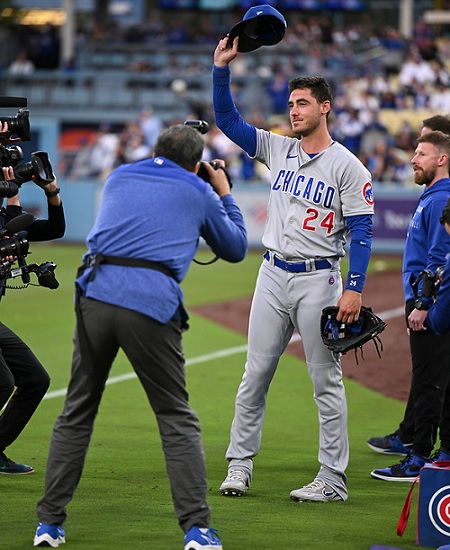
Even the Dodgers broadcasters were shocked by the display. SportsNet LA’s Joe Davis said with dismay, “Come on, Jim. Read the room,” followed immediately former Dodgers pitcher-turned-color-analyst Orel Hershiser adding, “That’s bad.”
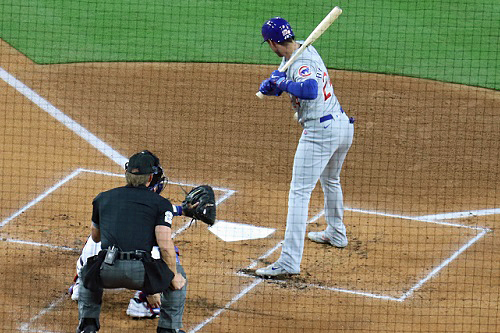
Not a good look for umpires, especially when the MLB has said they will be more lenient with the pitch clock during special moments in the sport.
Fast forward to the matchup Sunday afternoon to close out the series between the Dodgers and the Cubs. The game would be the series tie-breaker before Los Angeles faced the New York Mets on Monday.
There were several blown calls but none more egregious than a clear ball-called-strike that ended the game in favor of the Cubs 3-2. In case you missed it, there were several blunders leading up to that final decision by home-plate umpire Sean Barber.
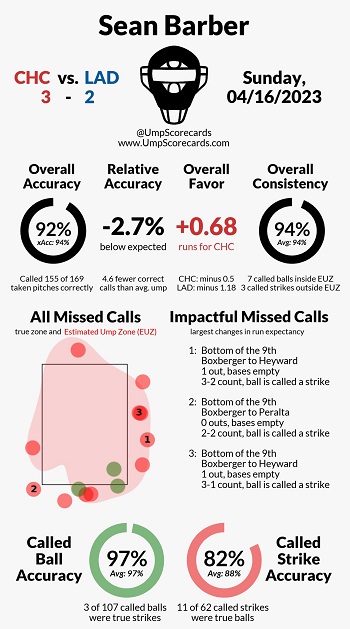
Settle in…
In the bottom of the ninth inning, down a run, Dodgers outfielder David Peralta came in to pinch hit for utility infielder/outfielder Chris Taylor. The lead-off hitter was in a 2-2 count when he was called out on strikes on what should have been a ball on the lower, outside corner. Fans let their dissatisfaction be known loudly.
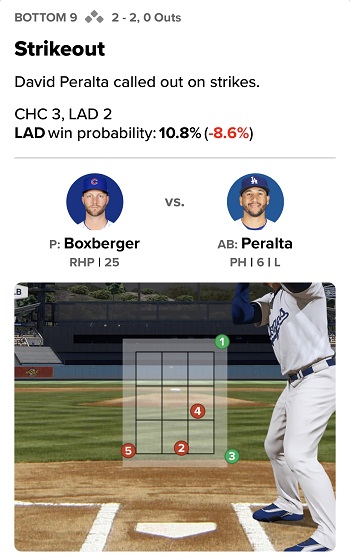
This brought up Dodgers outfielder Jason Heyward to pinch hit for catcher Austin Barnes. With one out and on a 3-1 count, the next pitch was way inside and should have resulted in a walk since it was clearly out of the strike zone. Surprisingly, home-plate umpire Sean Barber called it a strike as the jeers from fans began again.
As Heyward settled back into the batter’s box on a now 3-2 count, the next pitch landed in almost the same spot. Instead of correcting the call and issuing a walk, the umpire called Heyward out on strikes.
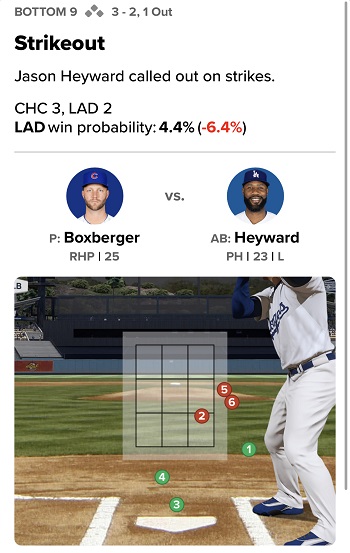
Both Peralta and Heyward had hitters’ counts and were on the receiving end of bad calls at the plate. The Boys in Blue effectively had their legs cut out from under them, resulting in two poorly called outs. The fans were loudly protesting at this point.
Dodgers right-fielder Mookie Betts was able to hit a grounder to the left side that Cubs first baseman Trey Mancini was unable to dig out. The Dodgers now had the tying run aboard.
Dodgers first baseman Freddie Freeman represented the winning run at the plate. On an 0-2 count, a ball that was nowhere close to the bottom of the digital strike zone was called a strike by Barber for the final out of the game.
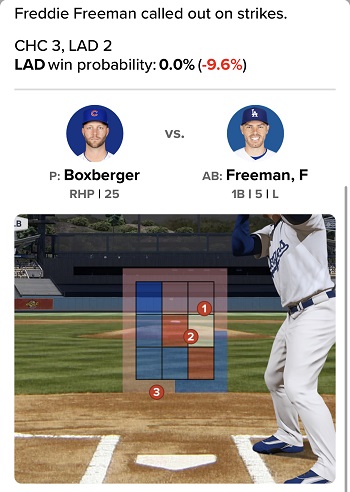
Despite being inches off the plate in each instance, three missed calls ended the bottom of the ninth inning for the Dodgers, resulting in a 3-2 loss. Fans, players, and Dodgers manager Dave Roberts were all visibly upset by the call. And while many do not want any more drastic changes to the game, the call for “robot umpires” is gaining traction as each of these incidents occur.
It is always clearer in retrospect, but we have tools that mean we do not have to wait for hindsight. Yet, without the ability to challenge a blown call, the support for eliminating the human element in umpiring grows. Especially when everyone can see in real time with the aid of the digital strike zone on televisions, as well as the in-stadium replays, but sadly still powerless to do anything.
The approach that fans call “robot umps,” and what is officially being referred to as the “Electronic Strike Zone”, is already being tested out in the minor leagues. Commissioner of Baseball Rob Manfred has mentioned that fans could see it as soon as the 2024 season. However, data is still being gathered, and there is no set timeline on when it could roll out at the Major League level.
In an article by ESPN’s Buster Olney on January 12th of this year, he detailed MLB’s initial trial of the using robotic umps of in the MiLB.
“The electronic strike zone will be used in all 30 Class AAA parks in 2023,” wrote Olney
The Automatic Balls and Strikes system, commonly referred to as ABS, will be deployed in two different ways. Half of the Class AAA games will be played with all of the calls determined by an electronic strike zone, and the other half will be played with an ABS challenge system similar to that used in professional tennis.
Each team will be allowed three challenges per game, with teams retaining challenges in cases when they are proved correct. MLB’s intention is to use the data and feedback from both systems, over the full slate of games, to inform future choices.”
Games ride on the little details just as much as the big plays. All 162 games matter, whether it is the start of the season, or as the year winds down. Here’s to hoping one way or another that this gets resolved quickly. Otherwise we may be getting used to a more mechanical element in the future.
Let’s go Dodgers!
* * * * * *




 April 18th, 2023 at 9:00 am
April 18th, 2023 at 9:00 am  by 0799291000348
by 0799291000348  Posted in
Posted in 

It is a farce if MLB has the means to fix this glaring problem and does not use it.
I agree. Even if it’s an interim fix like allowing for small set of challenges per game. Especially for those glaring instances. It would allow some small measure of balance when games can ride on the accuracy of calls at the plate.
I am as old-school as they come and not a big fan of changing a game that has been near-perfect for a very long time. But with the egregiousness of the umpiring over the past few seasons, I am now on the robo-ump bandwagon BIG time.
It’s broken. Fix it.